Croatian Tourist Board Recaps Season 2022, Many Records Broken
January 3, 2023 - The Croatian Tourist Board recapped the tourist season 2022 in Croatia, commenting on the positive results in visits and overnight stays, and expectations for 2023.
As Poslovni writes, last year, Croatia achieved 91 percent of its 2019 turnover in arrivals, and 96 percent in overnight stays, with a total of 104.8 million overnight stays, and foreign revenues are expected to amount to around 13 billion euros.
"The year 2022 was also a record year in terms of some of our biggest markets, such as Germany, Austria, Poland, the Czech Republic, Slovakia and the Netherlands, from which we achieved almost 800,000 more arrivals than in 2019.
This is also a great announcement for the year 2023, especially in the context of Croatia's entry into the Schengen area and the eurozone. Our focus in 2023 remains on quality, sustainability and innovation, so that the successes of tourism are long-term and additionally contribute to the overall economic and social development of Croatia", said Minister of Tourism and Sports Nikolina Brnjac.
Kristjan Staničić, director of the Croatian Tourist Board, reminded that this year the implementation of the new Strategic Marketing and Operational Plan of Croatian Tourism, a new umbrella communication concept and slogan, and a new marketing direction towards sustainable development are expected.
"In 2023, our goal is the complete recovery of tourism, the achievement of pre-pandemic tourism results at the level of the entire country, and an even stronger dispersion of tourist traffic in the pre- and post-season.
We will emphasize the promotion of the Croatian islands, the hidden pearls of the Croatian tourist offer in the interior of the country, the luxury offer, gastronomy, but also all those tourist products that generate tourist consumption throughout the year", said Staničić, adding that what lies ahead, considering inflation, rising energy prices and geopolitical tensions, is another very demanding and challenging tourist year.
For more, make sure to check out our dedicated Travel section.
Euro Croatia is Here, and You Guessed It - Much More Expensive
January 3, 2023 - Euro Croatia is here. It is its third day. And Croatian citizens have started complaining about massive price increases. Social networks are full of various examples of price increases after the introduction of the euro, whether it is for shops, various services such as hair salons, or parking fees.
As Index writes, what most of the complaints have in common is the rounding up. So, for example, if something cost HRK 13, it is possible that someone "rounded" it to two euros, which is significantly more expensive.
A group was opened on Reddit yesterday, where hundreds of people write about price increases and give examples. "Men's haircut at a local hairdresser cost HRK 60. I came a couple of days ago. He said he would round up to 10 euros to make it easier for both of us," wrote one user. "Coffee with milk in the cafe where I've been going all my life jumped from 12 to 15 kunas," wrote another.
Index received photos from shops by users claiming that the same things cost significantly less just two days ago. Index is currently working on verifying those allegations.
>> If you suspect an unjustified increase in the price of a product or service, contact them at This email address is being protected from spambots. You need JavaScript enabled to view it.
Prime minister's meeting yesterday
Yesterday afternoon, Prime Minister Andrej Plenković convened a meeting with competent ministers and inspection authorities.
As the Prime Minister stated in a message published on Twitter, he held a meeting with competent ministers and representatives of the Tax Administration, Customs Administration, and the State Inspectorate related to further activities to protect consumers from unjustified price increases.
"The introduction of the euro is not a reason to increase the prices of goods and services," said Plenković.
Filipović called an urgent meeting.
At Plenković's meeting with the ministers and the heads of the Tax Administration, Customs Administration and the State Inspectorate, it was agreed that Economy Minister Davor Filipović would invite representatives of retail chains to the meeting.
The meeting, unofficially confirmed to Index by a source close to the government, should be held today.
"The consumer must not be in a worse position than they would have been if the euro had not been introduced."
What is considered an unjustified price increase that caused Plenković to react? Here is what is written on the official government website Euro. hr.
"According to the principle of consumer protection, it follows that the consumer must not be in a less favourable financial position than he would have been if the euro had not been introduced. As in all other situations, in the period of dual pricing, it is necessary to correctly and accurately apply the rules of conversion and rounding, which means that the price must be correctly calculated and stated, i.e. the informative calculation in the currency that was or will be official must accurately reflect the price charged to the consumer and must not be rounded up or down.
The ratio of expressed prices in kuna and euro must correspond to a mathematical operation, i.e., the rules of conversion and rounding by applying a fixed conversion rate in its full numerical amount."
"The mere introduction of the euro must not be and is not a justified reason for increasing product prices."
The page states that this means explicitly that from the beginning of the period of mandatory dual pricing until the day of the introduction of the euro, for the purpose of informing consumers, the price charged in kuna must be recalculated and displayed in euros, with the correct application of the fixed conversion rate and the rules for recalculation and rounding.
The key principle of the introduction of the euro is consumer protection, and the consumer must not be in a financially less favourable position than he would have been if the euro had not been introduced. The mere introduction of the euro must not be and is not a justified reason for increasing product prices," the EURO HR website concludes.
Knežević: People complain the most about coffee price increases
Index asked the president of the Consumer Protection Association, Ana Knežević, what information she had about price rounding and the resulting price increases.
"We have concrete information; people are calling and complaining. The highest price increases are around coffee. We received a report that in one place coffee is two kuna more expensive because of this rounding of prices," Knežević told us.
"This happened in all the countries that entered the eurozone; we saw it in Slovenia, Austria, Italy... We warned that Croatia would not be an exception. In the mentioned countries, too, coffee prices changed the most. In our country, we now see that there were price increases in bakeries as well".
For more, make sure to check out our dedicated Lifestyle section.
Croats Living in Croatia, Earning Abroad: Dorian Antesic on Island Rab
January 3, 2023 - The Croatian dream - to live in Croatia and get income from abroad. Meet the locals who are living that dream, and find out how you could, too, in a new TCN series. In the third in the series, meet Dorian Antesic, who is enjoying life on the island of Rab.
Croatia, great for a 2-week holiday, but a nightmare for full-time living unless you are very rich, so the perceived wisdom goes. The Croatian dream is to live in Croatia with a nice income from abroad, as many foreigners and remote workers do. For Croatians, if I read the comments in my recent video, Croatia is the Best Place to Live: 8 Reasons Why (see below), salaries are too low and people are forced to emigrate in search of a better life.
While there is definitely an element of truth to this, it got me thinking. The era of remote work is here, and the workplace is increasingly global, with a labour shortage for many skills. It doesn't matter if you are from Boston or Bangladesh if you have the skills, desire, and work ethic, and are able to work remotely online. And while it is certainly true that salaries in Croatia are low, what about the opportunities that the global online marketplace offers? If foreigners can find ways to live in Paradise and work remotely, why not locals? Curious, I posted this on my Facebook and LinkedIn yesterday:
Do I know many Croats who are living in Croatia, but working remotely for international companies who would be interested in being part of a TCN interview series showcasing living in Croatia but earning online, including advice to others on how to get started? It could be an interesting series. If interested, contact me on This email address is being protected from spambots. You need JavaScript enabled to view it. Subject Remote Croatia.
Some 15 emails - and several inspiring stories - later, and I think we have the makings of what could be a rather interesting series, Croats Living in Croatia & Earning Abroad. Next up in the series, Dorian Antesic on the island of Rab.
My name is Dorian Antešić and I come from the Island of Rab. I am a writer and analyst in the field of immigration and bitcoin. I help people figure out how to benefit from this little orange thing called "bitcoin" and how to internationalize their life through obtaining a second residence, passport, alternative investments, and similar.
I studied finance in Rijeka, Prague, and Coimbra in Portugal. Due to my adventurous soul, I spent quite a substantial time in my early 20s traveling across Europe. As my grandma would say, I have "mrava va guzici" (literally "ants in the ass"), so I have seen and lived in a lot of places in the last 6 years. Many places, many people, and different cultures, but, at the end of the day, home called, and I answered gladly.
1. Many Croats are emigrating but you not only chose to stay, but managed to achieve the Croatian dream - living here and working for an international company. Tell us how you did it.
My Uni years were spent exploring Europe and working various jobs. From working as a waiter to leading NGO projects and starting my podcast. I gained a lot of work experience and got a "travel bug", so when Uni life was coming to an end, I wanted to continue the international lifestyle.
I wanted to be an entrepreneur, but I wasn't 100% sure about myself. So I let God decide for me. At the same time, I was trying to find work in a company AND find clients as a freelancer. Whatever comes first I will continue with that. After some time passed, I received two offers in the same week. One was a work offer from a big financial company in Luxembourg and the other was a freelance offer from a "remote-only" company.
I was in a dilemma. Luxembourg company paid more (with big corporate benefits), but I would have to move and settle in Luxembourg. And the city in e-x-p-e-n-s-i-v-e.
On the other hand, the freelance offer allowed me to work from anywhere I wanted, additionally, I could start my "adult" entrepreneurial venture. Although with a higher risk, I choose the freelance offer. It paid off. I developed a great relationship with this client and found other clients.
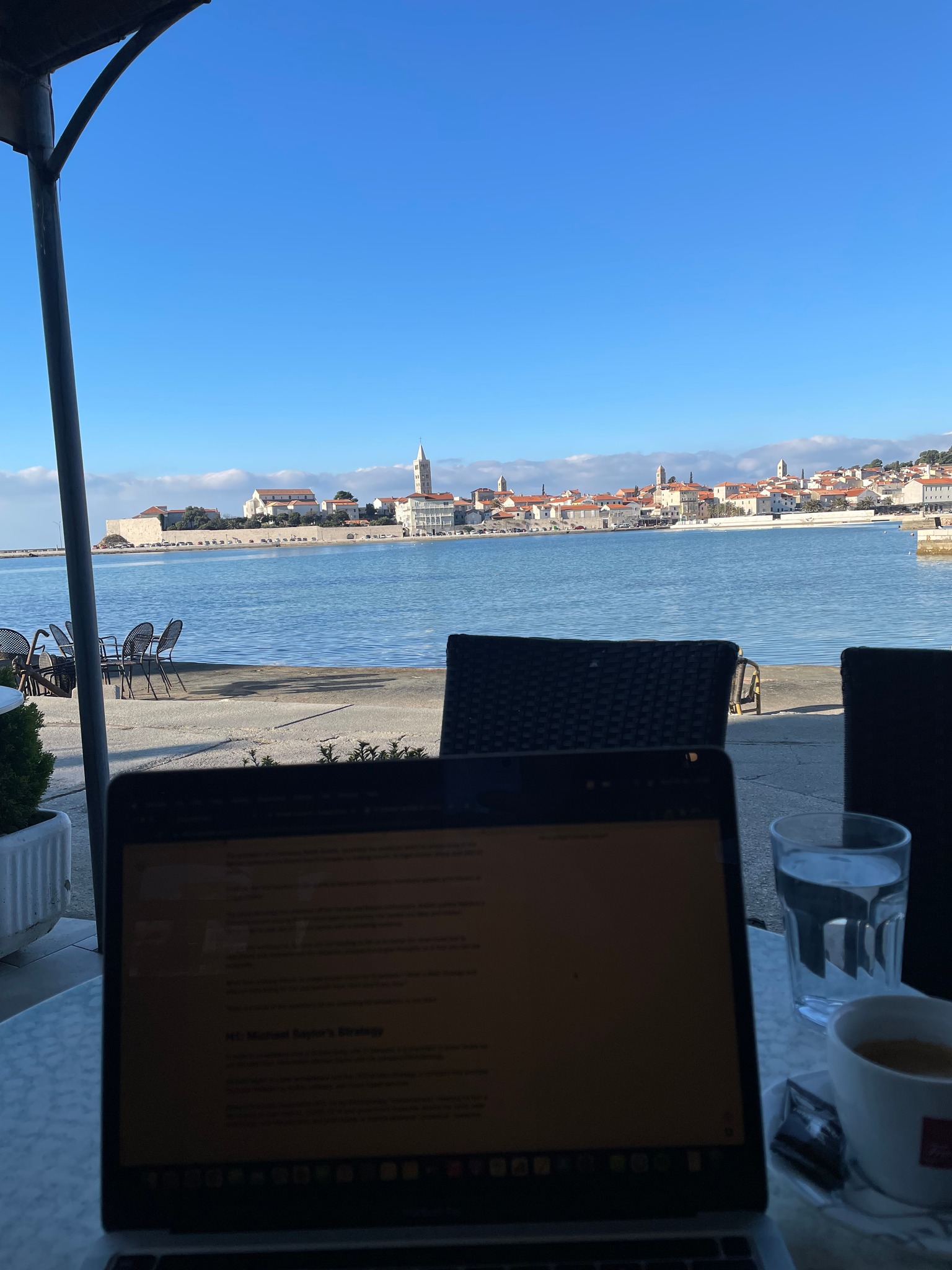
2. Looking for jobs based in Croatia can be a challenging task. How challenging was it for you to get where you are today - it must have taken a lot of determination and rejection.
I was mentally prepared as I knew it would be hard work to find something that suited me well. I must have sent at least 100 proposals, with just a few interviews and responses. There were times when you got a bit down due to no results. I would hit the gym and go to the beach to relax. My friend was in a job search as well, so we encouraged each other.
Determination paid off substantially. In my first "entrepreneur year", I managed to work with two of my business role models. I work with Sovereign Research (ex-Sovereign Man) and the bitcoin economist Saifedean Ammous. I read their books, articles, analyses and lectures during my Uni years, so I was thrilled to work and learn from them.
3. If you can do it, presumably others can too. Are you aware of others who have had similar success, but maybe in different industries?
Yup, for sure. I studied and lived with a couple who had a similar life projector. Actually, in 2022 I spent 6 months living and traveling in Spain with two Croats from Split who work remotely. They are in engineering and marketing. When you think about it, a lot of work these days is done via a computer. Even some parts of medicine. If you can work on a computer in an office, then you can just as easily work from anywhere you want.
Now, I don't want to be that guy who says "Remote work is everything, everyone needs to do it." No...Remote work does have its pros and cons, so it's only for some at certain times, but I would definitely recommend people think about it. It might be just the right thing for them.

4. What is the general feeling among people in Croatia today. Is it possible to have a good life here, or is the grass greener on the other side?
It seems to me that Croatians are divided into two opposite categories: those who want to leave as soon as possible and those who don't even want to think about leaving. Between these two "extremes," I prefer the latter. To quote the British writer Chesterton: "Men did not love Rome because she was great. She was great because they had loved her."Any place can become a "new Rome" if people put their unconditional love and focus into it. The good Lord created an abundant world, and we have to have an abundance mindset. Opportunities are everywhere.
Now, I don't want to moralize others that they shouldn't leave at all. People have their circumstances. Some people don't have a choice at a particular moment in their life. Everyone's life situation is specific. What I want to point out is that these two extremes aren't the only options. You can go abroad and still come back. You can explore the world if you want, but please remember where your home is. So it's not really "either to move away or stay home." You can have both. I still plan to travel internationally. I just began, but I know where to focus my determination.
I will create a "new Rome" out of my little Island of Rab. And I am not alone in this. I have friends, and I know people who are professionals in business and IT who share the same goal. Even though they might not express their goal the same as I did, we all have the same vision of a new Rome. The vision is beautiful, but it will require a lot of work from us. And a little help from the above.
5. Apart from corruption and nepotism, low wages are often cited as a reason to emigrate. But with the remote work revolution, as your example has shown, as well as the influx of many foreign workers to the likes of Rimac and Infobip for example, show that a good quality of life IS possible in Croatia. What are your thoughts on that?
Remote work is a gift from the above for Croatia. Before, you had to leave Croatia to have an opportunity to be in the "big league" with the top players. Now you don't have to. You can work from home and be on the same playing field as people in big cities or more developed countries. This is even more emphasized in smaller places like my Island of Rab. You don't have to move to Zagreb to find a good-paying job or clients. And you don't have to limit yourself to the tourism sector if you don't want to move from home. You can have all the benefits: be home AND work where you want. It's great!
6. What advice do you have for others who would like to stay in Croatia, but have no idea where or how to find a possible remote work job or business as you have managed to do?
Remember that it can take some effort to find what will suit you. And then start applying. As I mentioned, I have sent at least 100 proposals in my first two months of searching, with just a few responses and fewer interviews. But it paid off. Big time. Think about companies you like and visit their "Careers" site. Send your CV and motivation letter even if there isn't an active job opening. None of my clients actively searched for help when I contacted them. Use also LinkedIn. There are many job listings there. It's easy to apply through the platform, but consider that companies will receive MANY job applications. It's better to directly contact companies that you like and try to get some response.
And just be persistent...
7. Three reasons you decided to stay in Croatia, and the one thing you would like to change in this country.
The first reason is family. This is the place where my parents are, grandparents and cousins. It's a healthy thing to raise your own family surrounded by elders and relatives.
Secondly, it's my home. You shouldn't need a reason to love something. You love it unconditionally. Therefore, I do love my island without reason. It's the irrational people that improve things. So my duty (our duty) is to improve the place where we belong.
Thirdly, Croatia is still a majorly Christian country with Christian values. I was not too fond of the secular value system pushed in the more "western" countries. It's a life not lived according to our creation. It's a distorted life with wrong priorities. Croatia is still relatively healthy, so if I want to raise a healthy family, this is THE place to be.
Regarding change, I would like to have more competitive tax structures. Croatia has the "paušalni obrt" structure up to €40,000, which is solid, but I think this can be better. My job is to research global immigration and tax structures, so to give you an example, the Republic of Georgia has a tax structure of 1% tax on income up to $164,000 (around €155,000). Many foreigners in recent years have flocked to Georgia to benefit from this structure. The Croatian digital nomad visa was a success. I believe that a rise of "paušalni obrt" tax structure max cap would benefit Croatia even greater. We have everything digital entrepreneurs need PLUS our location, climate and pleasant culture.
You can check my website at www.antesic.com and my LinkedIn profile if you want to hear more from me.
****
Thanks Dorian, very inspiring, and congratulations on all your success.
You can follow the rest of this series in the dedicated TCN section here.
If you would like to contribute your story to this series, please contact This email address is being protected from spambots. You need JavaScript enabled to view it. Subject Remote Croatia.
****
What is it like to live in Croatia? An expat for 20 years, you can follow my series, 20 Ways Croatia Changed Me in 20 Years, starting at the beginning - Business and Dalmatia.
Follow Paul Bradbury on LinkedIn.
Subscribe to the Paul Bradbury Croatia & Balkan Expert YouTube channel.
Croatia, a Survival Kit for Foreigners is now available on Amazon in paperback and on Kindle.

Save a Life, Donate Blood - Significant Drop in Blood Supplies in Croatia
January 3, 2023 - The Croatian Blood Donors Association has announced that the blood supply has dropped significantly, with blood group A+ being the most lacking, urging everyone to donate blood.
"Due to the sudden drop in blood supplies, we appeal to A+ donors and donors of all blood groups with a negative RH factor to contact the Croatian Institute for Transfusion Medicine, Petrova 3, as soon as possible.
The photo shows the current state of blood supplies according to blood groups. As can be seen, the stocks of all negatives and A+ are in decline.
Please respond to the appeal and donate blood for your fellow citizens in need.
Thank you for sharing this information so that it reaches as many people as possible," reads the announcement, as reported by Index.
Due to the upcoming holiday when blood is not collected and the current reduction in the blood supply of A positive blood group, the Croatian Institute of Transfusion Medicine (HZTM) also invited citizens to donate blood as a preventive measure.
"As soon as there is a non-working day, we immediately appeal and call citizens to donate blood to those supplies that are currently lower," said HZTM director Irena Jukić Hina.
She added that the institution is not currently in a situation where there is a blood shortage, but supplies have been reduced and a holiday is approaching when blood is not collected. Currently, stocks of A-positive blood groups and blood groups with a negative Rh factor are lower.
The lack of supplies of blood groups depends on the current demand, and, as Jukić said, there is never 100 percent certainty or reliability in transfusion that everything will be available. "Patients are the ones who dictate the state of supplies - currently, there is an increased demand trend for A positive blood group, and this is prevention," Jukić said.
Citizens can donate blood every working day and on Saturdays from morning to evening in Petrova 3 in Zagreb. To donate blood, it is necessary that a person feels well, is young enough (from 18 to 65 years old), and weighs more than 55 kilograms.
Before donating blood, a short medical examination and a hemoglobin test are performed. Jukić also emphasizes that donators should eat and drink something before donating blood.
For more, make sure to check out our dedicated Lifestyle section.
Croatia Gears Up for 2023 World Handball Championship in Poland and Sweden
January 3, 2023 - The 2023 World Handball Championship will be held in Poland and Sweden from January 11 to 29.
The 2023 World Handball Championship will be played in Poland and Sweden from January 11 to 29. This means the Croatia men's handball team is finally back in action!
Croatia gathered on New Year's Eve and began final preparations for the World Championship. As part of their final preparations in Poreč, the Croatian Handball Federation traditionally organizes the Croatia Cup. Croatia will thus face North Macedonia in Poreč on January 6 and Israel on January 8. Tickets for all Croatia Cup matches can be purchased at www.ulaznice.hr. The price of a single ticket is 8 euros (60.28 kn).
At the 2023 World Handball Championships, Croatia will play in Group G, hosted at Husqvarna Garden in Jönköping, Sweden. Croatia will play against Egypt, the United States of America, and Morocco.
The format of the competition is the same as in the last World Championship, so a total of 32 national teams will be divided into eight groups of four teams.
The three best national teams from each group advance to the second round, which brings crossover groups (A-B, C-D, E-F, G-H). From these newly formed second-round groups, the two best teams will advance to the quarterfinals, where the knockout phase of the tournament begins.
Group G meets Group H, which includes current world champions Denmark, Belgium, Bahrain, and Tunisia. That second round will be played in Malmö, in the Malmö Arena.
Group G (Jönköping)
1st round, January 13
18:00 Morocco - United States of America
20:30 Egypt - CROATIA
2nd round, January 15
18:00 Egypt - Morocco
20:30 CROATIA - United States of America
3rd round, January 17
18:00 United States of America - Egypt
20:30 CROATIA - Morocco
Group IV (Malmö)
1st round, January 19
G1 - H3
H1 - G2
G3 - H2
2nd round, January 21
G2 - H3
H2 - G1
G3 - H1
3rd round, January 23
G1 - H1
G2 - H2
G3 - H3
Quarterfinals
January 25
? - ? (Gdansk)
? - ? (Stockholm)
? - ? (Gdansk)
? - ? (Stockholm)
Semi-final (Stockholm)
January 27
18:00? - ?
23:00? - ?
Match for third place (Stockholm)
January 29
18:00? - ?
Final (Stockholm)
January 29
? - ?
To follow the latest sports news in Croatia, follow TCN's dedicated page.
Croatian Returnee Stories: Paula Pintaric, From Amsterdam to Koprivnica
January 3, 2023 - Whisper it quietly, but more and more people are relocating to Croatia from the diaspora. In a new TCN series, we meet them to find out how they are faring and what advice they have for others thinking of making the switch. Next up is Paula Pintaric, who moved back from Amsterdam to sunny Koprivnica.
Hi! My name is Paula. I am a 30-year-old product designer born in Croatia who decided to move abroad in search for a better life just to find out that life in Croatia is pretty damn amazing. :)
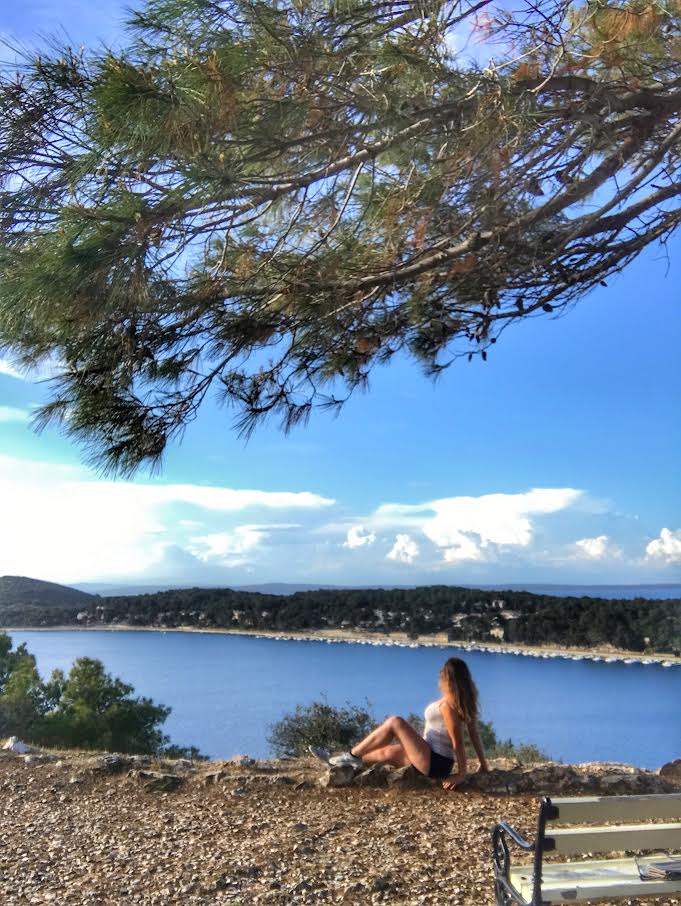
1. You made the switch to Croatia. Tell us a little about the decision process and how long it took for you to get on the plane.
Being pretty disappointed with Croatia, I moved to Amsterdam right after finishing my faculty. I lived there for around 4,5 years - I spent a lot of time exploring the country, traveling, dancing, going to parties, and hanging out with friends. I quite enjoyed it - it was a valuable experience for me. When Covid hit, Croatia opened up quite quickly in comparison to the Netherlands, so I used the opportunity to spend some time with my family and friends back in Croatia while working remotely. I was quickly reminded of the warmth of Croatian people, endless coffees, and a much easier tempo of living. After a few months, I flew back to Amsterdam, but I didn’t feel anymore that I want to live there. I kept thinking of great memories created back in Croatia, so pretty quickly after that, I found a job back in Croatia and moved. It all happened in a few weeks - I applied for a job, got it, went back to pack my stuff, and said bye to Amsterdam!
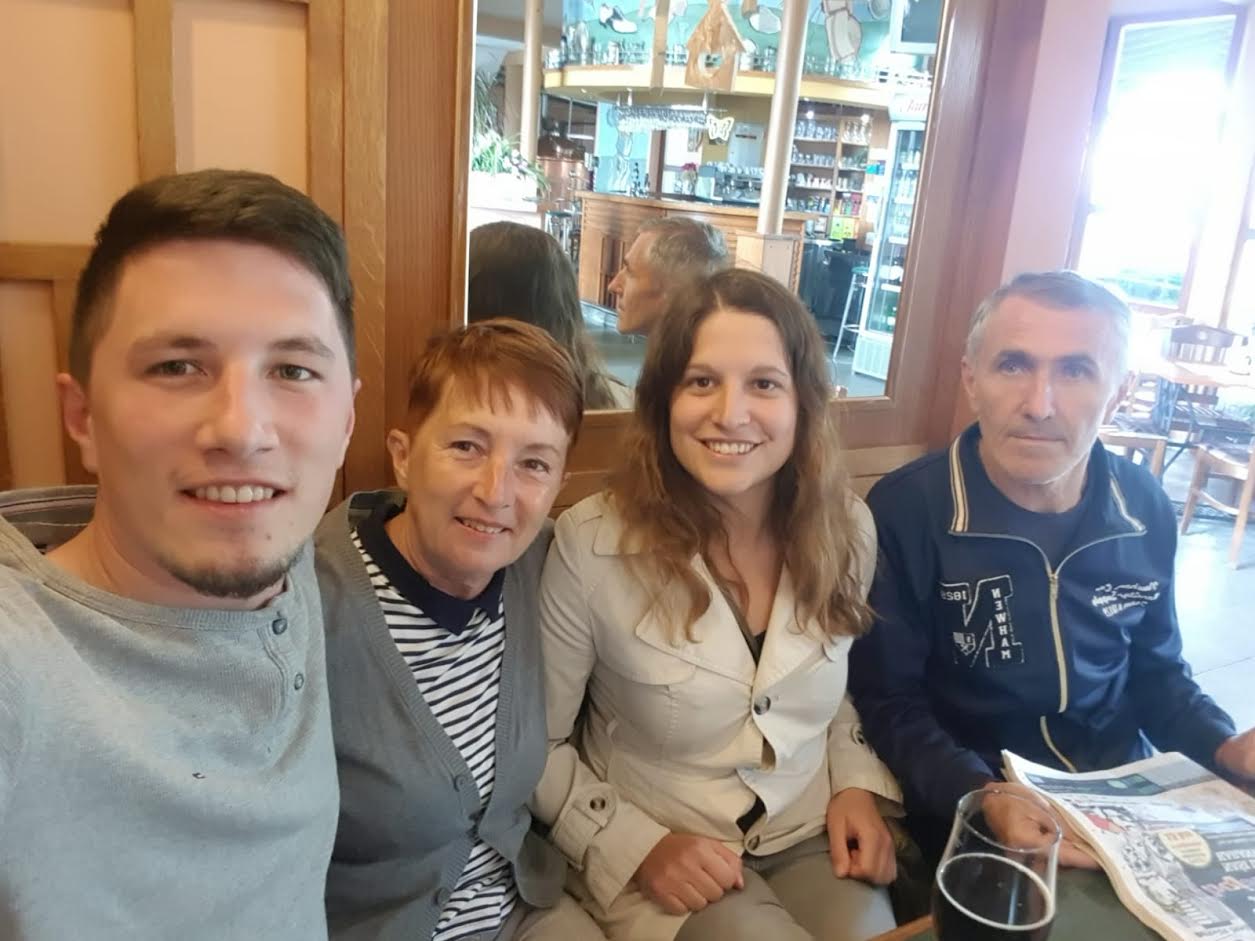
2. What did your family and community back home think of your decision at the time?
My parents were in disbelief for a few months, but I felt quite supported by my friends and family in Croatia, even though most of them were surprised by my decision. I still quite often get asked WHY would I move back to Croatia after living in Amsterdam. I usually say my time there was amazing, but I wouldn’t repeat it.
3. Think back to the time before you arrived. What were your perceptions about Croatia, and how were they different from the reality you encountered?
I lived in Croatia until I was 24, so I was aware of most of the realities and the things people in Croatia usually complain about. By living abroad, my perspective changed quite a bit, and I saw my country in a completely different light when I was moving back. I feel there is this culture of collective dissatisfaction that is quite strong in Croatia - western countries are often idolized, and we often take for granted the beautiful way of living we have. We’re forgetting that we’re quite connected to each other; we easily open up, spend a lot of time hanging out, and at the end of the day, this is priceless to me :)
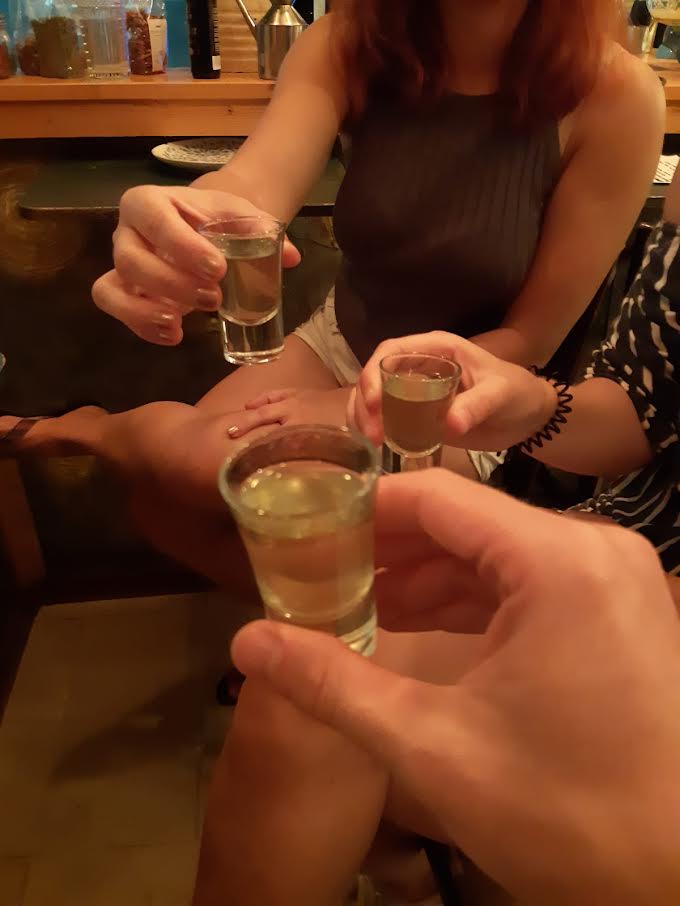
4. What were you most nervous about making the switch? What was your biggest fear, and how was the reality of what you found?
I didn’t really have any fears about coming back. I was actually pleasantly surprised because I got a feeling a lot of things progressed over the 4 years I was away. I was a bit worried about the bureaucracy and paperwork I need to do, but people working in the tax office actually helped me a lot, so everything went smoothly.
5. You are still here, so obviously, the pros outweigh the cons. Tell us about some of the things that you love about being in Croatia, as well as some of the things you don't like.
I love the way of living - endless coffees, hanging outs, pretty much everything about the community, better work/life balance, and a slower pace of living. Next to that, we really have beautiful nature, a great climate, food, and a lot of sunshine. I even love a bit of the Balkan craziness that comes with living here. I think this is a country with a lot of potential, and I would love if we could see it that way and start putting more effort as individuals in order to make it better economically. I don’t like that we see the current economical state here as the sole responsibility of a few people/government. I think we all have a say in it, but we need to stop complaining and do something about it.
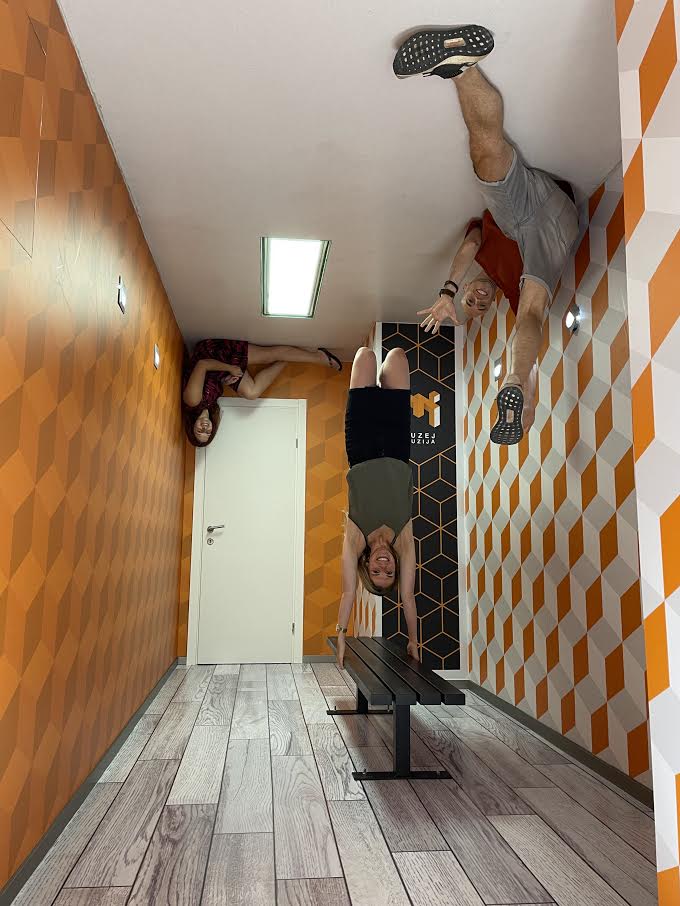
6. What advice do you have for others thinking about making a move from the diaspora?
I think the key to a painless move is patience and gathering as much information as possible. Everything can be solved, and people are quite willing to help out, even when it comes to complicated bureaucracy stuff. After you cross that hurdle, there is a lovely country full of possibilities on the other side. :)
7. How do you think Croatia can better assist those who are looking to return to the Homeland?
I didn’t need much assistance, so it’s difficult for me to say how it could have been done better. I’m not sure what it would look like if I grew up in another country or made a permanent move to the Netherlands for a longer period of time. Coming back after up to 5 years of living abroad is quite painless.
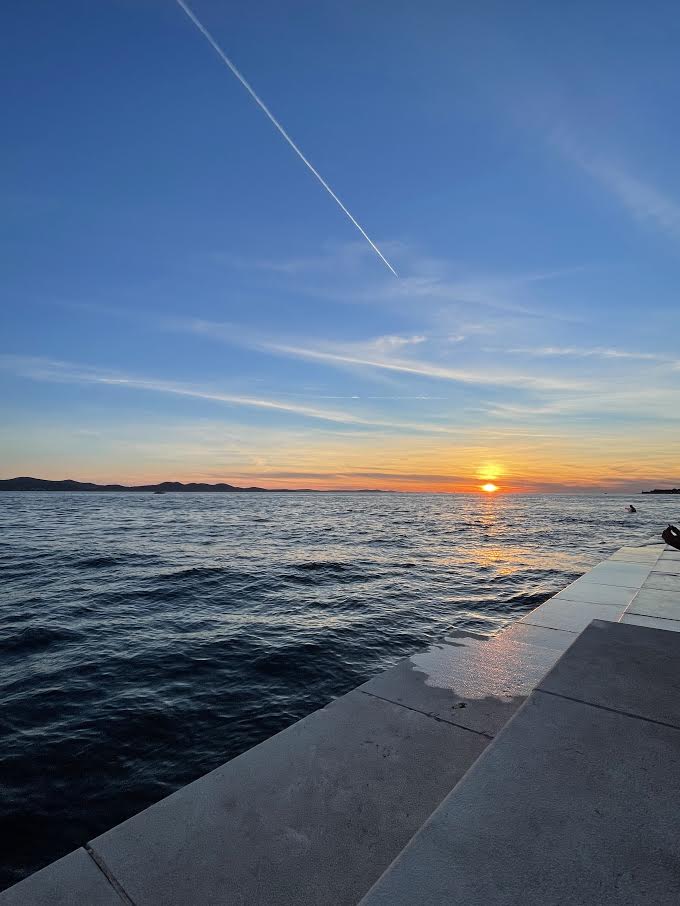
****
Thanks, Paula, and enjoy your time in Croatia.
You can follow the TCN Croatian Returnees series here.
If you would like to contribute your returnee story, please contact This email address is being protected from spambots. You need JavaScript enabled to view it. Subject Returnees
You can subscribe to the Paul Bradbury Croatia Expert YouTube channel here.
****
What is it like to live in Croatia? An expat for 20 years, you can follow my series, 20 Ways Croatia Changed Me in 20 Years, starting at the beginning - Business and Dalmatia.
Follow Paul Bradbury on LinkedIn.
Croatia, a Survival Kit for Foreigners is now available on Amazon in paperback and on Kindle.

Croatian Company Protostar Labs Launches Innovative Product
January the 3rd, 2023 - The Croatian company Protostar Labs, a young company from Belisce, recently presented and delivered its high-tech product called the Protostar Vision Box to its client.
As Poslovni Dnevnik/Josipa Ban writes, the aforementioned is a solution that they have been developing for a year now, and which enables visual inspection of products on production lines. Its application, as explained by Filip Novoselnik, the co-founder and director of the Croatian company Protostar Labs, is extremely broad, but they're still primarily focused on industrial production in larger series.
The delivery of the Vision Box is just the beginning of the application of artificial intelligence (AI) and computer vision technology that they've been busy developing, which contributes to the automation of industrial production. It contributes because it enables the quick and early detection of any product defect. In addition, it gives the company that uses it an in depth insight into all sorts of data and statistics via the Protostar cloud platform, which enables the better organisation of the overall production process.
All of these advantages will soon be made available to more companies as the Croatian company Protostar Labs is working on the development of two more versions of the Vision Box. The smaller one, which consists only of a small computer with a camera, will be intended for wider application because it has all the characteristics of a surveillance camera, only this one will be smart. According to Novoselnik, the bigger one will be a more sophisticated version of the existing Vision Box.
Both new versions should be ready and on the market in three to six months, and with their launch, the founder of the Croatian company Protostar Labs expects to increase the company's general level of competitiveness and ensure access to demanding foreign markets.
What is particularly interesting about this young but promising company from Belisce, whose development office is located in Osijek, is that, in addition to solutions intended for the automation of the "terrestrial" industry, they also develop solutions for the one in space, something that hardly any company in Croatia can boast of.
Ultimately, the universe and its puzzles were the reason why the Croatian company Protostar Labs was founded. The idea, as recalled by Novoselnik, was born in the Anonymus Astronomical Society in Valpovo. "Back in 2019, the informal founding assembly of Protostar Labs was held there, and the name of the company was inspired by space and means 'a star in the making'. Our initial idea was to profile ourselves in the long term as a company that develops solutions for the space industry, but at the time it seemed an unlikely feat, so we decided to start with what was more attainable for us, which is the domestic industry, which really lacks high-tech solutions that facilitate, speed up, and ultimately optimise the production process. We started with the development of a system based on a combination of cameras and sensors and AI algorithms, the goal of which is visual inspection of products,'' stated Novoselnik.
Even though it seemed almost impossible just three years ago, the Croatian company Protostar Labs, which is still a small company that started its journey with only two employees, and today already has fifteen of them, is proof that with knowledge, persistence and creativity, anything is possible, even entering the space industry. They managed to do that last year when they passed the competition of the European Space Agency (ESA).
For ESU, as Novoselnik pointed out, they developed a software package that enables the faster and simpler development of solutions, i.e. models of AI and computer vision with the aim of their easier implementation on hardware devices with limited resources.
"Their application, on the one hand, is intended for satellite systems because satellites, which have limited capacity, process huge amounts of data that isn't very easy to send back home to Earth. Our solution should enable data processing to be transferred to a satellite and only data of interest should be sent back to Earth," he explained, adding that a prototype has been developed, but the solution is still in the early stages of development and still needs to be tested. They have already tested it out on drones, and the plan is to do the same on a stratospheric balloon at an altitude of 20 kilometres. ESA will decide whether or not to test it on a satellite, and if that doesn't happen, the system they developed will be used here on Earth.
"Our idea is to develop systems that have a dual application and that high technologies that are designed and made for space can also be applied in industry," Novoselnik pointed out. In addition to all of the above, the Croatian company Protostar Labs is in the running for another project for ESA, in cooperation with the Zagreb-based FER, with which they are developing a module for the characterisation of light pollution on Earth. "We applied for the competition and we're waiting for the results,'' Novoselnik said briefly.
This small but doggedly determinted company from Belisce therefore develops numerous projects, and last year it all began to bring in financial benefits, as their income grew by as much as 730 percent compared to 2020, to an impressive 2.71 million kuna. This is encouraging indeed for such a young company that is still, to a large extent, focused on investing in the technology they're developing, not to mention the fact that they mostly financed this development with their own funds and those from the EU.
Small companies developing here in Croatia unfortunately, according to Novoselnik, are forced to spend too much time trying to deal with formalities and bureaucracy, and this comes to the fore especially with EU projects.
For more, make sure to check out our dedicated business section.
Valpovo Company SpectreXR Impresses with Innovative OctoXR Tool
January the 3rd, 2023 - The Valpovo company SpectreXR is showing that Eastern Croatia, more specifically Slavonia, can be known for far more than agriculture and demographic issues. Augmented reality is their game, and they've been making waves.
As Poslovni Dnevnik/Josipa Ban writes, augmented reality (XR), which includes VR, AR and MR technologies, is most often associated with video games, but its application, as revealed by Ivan Rajkovic, the founder and director of the Valpovo company SpectreXR, is far wider. This company which was founded six years ago aims at the industrial application of virtual and augmented reality with its OctoXR tool.
It is a tool that they have been working on developing for a couple of years now and in which they have invested an enormous 350 thousand euros. In 2023, they also hope to monetise this highly sophisticated product, with the help of which the user's hands become a management tool in the digital world, as well as in the real world.
The fact that their hopes have a realistic basis has also been well and truly shown by the fact that the quality of their OctoXR, after its presentation at Expo AWE in Lisbon, was recognised by two large and important technology companies - the Swedish Crunchfish and the American Ultraleap. In short, The Valpovo company SpectreXR, which consists of a team of six people, decided to facilitate and improve hand control in XR, and the functionalities they develop through OctoXR make that entirely possible.
"Our product gives physical properties to hands in the digital world. The hardware is in charge of recognising the hands, through sensors or cameras, and the software we develop enables us to use our hands in the digital world as well as we would in the real world," explained Rajkovic, who added that developing such a tool is a very complex job indeed.
"In addition to a higher level of programming knowledge, you must understand physics, maths, linear algebra and work in digital 3D spaces. Every point of contact between the digital hand and the digital object needs to be properly simulated, the rotations made by the bones relative to the position of the real hand need to be exact, and much more. I'm extremely proud of the team that managed to do it, and with a lot of effort," he added. Moreover, the technology they're developing is heading in the direction the whole industry is going, which believes that realistic control with hands instead of controllers will become key in both virtual and augmented reality.
Rajkovic thinks that joysticks, or controllers, will remain important in the video game industry, but the Valpovo company SpectreXR isn't targeting that sector. Instead, they've got their eyes on industries such as healthcare, automotive, aerospace, space, and manufacturing. In them, XR technologies already play a very important role, and they'll come to play an even bigger role in the future.
As one example, Rajkovic singled out DHL, which uses virtual reality in its employee training. This very well known company uses it, as he explained, to teach employees how to store packages on planes and on other means of transportation, thereby reducing overall costs and increasing productivity. The advantages of virtual training are used not only by logistics companies, but also by the automotive, aerospace, military, healthcare, trade, and manufacturing industries. In addition, it's a form of technology that can be used for the creation of prototypes, the visualisation of objects that go into production, immersive communication, and the list goes on and on. While large companies are reaping the benefits, small ones are more or less yet to really start applying it.
The moment is therefore right for positioning such a tool on the market, and the Valpovo company SpectreXR has all the prerequisites for that – their very own OctoXR tool. The fact that they are very much on the right track was confirmed by their participation in the aforementioned AWE conference in Lisbon, which specialises in XR solutions. There, they agreed to cooperate with Crunchfish and Ultraleap and successfully integrated their software with their solutions. The aforementioned collaborations are important to this company for several reasons. In addition to finances, the team from Valpovo should see the doors of large clients opened, and it will also further ensure their recognition.
"We also see it as a path towards numerous manufacturers of XR equipment, considering the contacts of our associates. We have a developed business model and are well on our way to capitalising on these opportunities. We're absolutely counting on that from January onwards," Rajkovic said.
For more, make sure to check out our dedicated business section.
Croatian Fuel Prices to Rise Tomorrow, Here Are the New Costs
January the 2nd, 2023 - With all of the celebrations surrounding Schengen and Eurozone accession, something less pleasant for drivers who are likely sick of the ups and downs - Croatian fuel prices are set to rise once again tomorrow.
As Poslovni Dnevnik writes, the Croatian Government held a telephone session today during which it passed the Decree on determining the highest retail prices of petroleum derivatives, according to which the highest retail prices are calculated according to the formula according to the base price of fossil fuel in the previous fourteen-day period.
This regards a limited margin of 0.0995 euros (0 .75 kuna)/l for diesel and petrol fuel, and 0.0531 euros (0.40 kuna)/l for blue diesel, 0.8229 euros (6.20 kuna)/kg propane-butane mixture for bottles, or 0 ,03716 euros (2.80 kuna)/kg for large containers. Compared to the previous Croatian fuel prices and their accompanying regime, the margin on diesel and petrol fuel, for energy entities, has been returned to the levels we saw back in June 2022.
This regime and as such the new Croatian fuel prices will be valid for the next fourteen day period.
The new prices will be as follows:
– EUR 1.33 (HRK 10.02)/l for petrol fuel (an increase of EUR 0.05)
– 1.47 EUR (11.08 HRK)/l for diesel fuel (an increase of 0.03 EUR)
– 0.97 EUR (7.31 HRK)/l for blue diesel (an increase 0.01 EUR)
– EUR 1.22 (HRK 9.19)/kg LPG for tanks (a reduction of EUR 0.01)
– 1.78 EUR (13.41 HRK)/kg LPG for bottles (a reduction of 0.01 EUR).
For more, make sure to check out our dedicated news section.
Schengen Croatia: What Can I Bring With Me into the Country?
January the 2nd, 2023 - Schengen Croatia is now finally a reality, with the country having joined a Europe without borders yesterday, as well as the Eurozone. While things are far more free, there are still items you can't take across the border. Here's an extensive list.
As Poslovni Dnevnik writes, Croatia became the 20th member of the Eurozone yesterday, and it also became the newest member of the Schengen zone, the largest area of free movement of goods and people in the entire world. From January the 1st, 2023, the period of dual circulation begins, which will last fourteen days, that is, until January the 14th, 2023 at midnight. During this period, when it comes to cash transactions, in addition to the euro, it will be possible to continue to use kuna banknotes and coins as a legal tender.
The amounts of money that must be paid or calculated are recalculated using a fixed conversion rate that is set at the level of 1 euro = 7.53450 kuna, which means that even if you pay in kuna, the change you'll get back will always be in euros.
If you're planning to travel abroad soon, you're more than likely wondering what you are (not) allowed to carry across the Croatian border and what the fines are if you break the rules, how many packs of cigarettes can be with you in the car, whether you'll be fined if you've got rolls of cheese and more bacon than anyone could ever eat in your boot. What about alcoholic beverages?
There are some illogicalities here, from some countries, you can bring in unlimited amounts of fish, from others you can't even have a single gram of meat, you won't have problems with sweets anywhere, but you will with baby food. Precisely because of all these rules, of which there are so many that sometimes it isn't easy to remember them even for the customs officers themselves, Vecernji list published a list of all the things that you may and may not bring into the newly crowned Schengen Croatia.
First and foremost, it should be noted that this list refers to the import of goods from countries which are outside the EU, with the exception of Switzerland, Iceland, Norway, San Marino, Andorra and Liechtenstein. So, for these last listed countries, the same rules apply as if you were transporting goods within the EU, meaning that there are no restrictions on them. Some other special rules apply to the Faroe Islands and Greenland, but in order not to further complicate this already long list, we will omit those two countries here. In short, if you import goods from third countries (e.g. Bosnia and Herzegovina, Serbia, Montenegro, Albania, etc.), the limit for importing goods must not exceed 3,200 kuna per person in sea and air transport and 2,200 kuna in all other types of transport, and 1,100 kuna for passengers under the age of 15, regardless of the means of transport they're travelling with.
Air passengers can bring slightly more tobacco products into Croatia than those who enter the country by other forms of transport. Those travelling by air can bring in 200 cigarettes, 100 cigarillos, 50 cigars and 250 grams of smoking tobacco. People travelling by road or rail can bring in 40 cigarettes, 20 cigarillos, 10 cigars and 50 grams of smoking tobacco. All passengers can bring the same amount of 50 grams of heated tobacco product, 10 milliliters of e-liquid and 50 grams of the so-called of ''new tobacco products'' from Article 94 paragraph 2 of the Excise Act. When it comes to alcoholic beverages, the same rules apply to travel by road, air and sea transport - everyone is allowed to bring in 16 litres of beer, 4 litres of wine and 2 litres of other alcoholic beverages which have less than 22% alcohol, so one litre of stronger alcoholic beverages.
Meat, fish, cheese, milk, eggs and other products of animal and plant origin
Customs officials carry out official controls on all products of animal origin that are part of the passenger's personal luggage, meaning bringing in meat and milk and meat and milk products isn't permitted whatsoever. Passengers are allowed to bring in 20 kilograms of fresh, dried, cooked, salted or smoked fish, prawns, crabs and mussels per person, however. When it comes to other products of animal origin, such as honey, eggs, egg products, snail meat or frog legs, passengers can enter Croatia carrying up to 2 kg per person of such items. When it comes to plant origin products, you may also bring up to 5 kilograms of fresh fruit and vegetables into the new Schengen Croatia, with the exception of potatoes.
Other products (such as baby food and food for pets, cakes, sweets, nutritional supplements, fuel...)
Passengers from third countries into Schengen Croatia can bring up to 2 kilograms of baby milk powder, baby food and special food used for medical reasons, as well as pet food used for health reasons, provided that it doesn't require refrigeration before opening. Without limit or in quantity for personal use, all travellers can bring bread, cakes, biscuits, waffles and wafers, double-baked bread, toasted bread and similar toasted products with less than 20% processed dairy products and egg products that are stable when left at room temperature.
Many other products such as chocolates and confectionery (including sweets) with less than 50 percent processed dairy products and egg products, food supplements packaged for the final consumer containing smaller amounts (in total less than 20%) of processed animal products can be imported without restrictions, as can processed animal products, olives stuffed with fish, pasta and noodles, soup concentrates and flavour enhancers.
When it comes to fuel, you can transport up to 10 litres of fuel identical to the one in your vehicle in canisters, so you cannot bring in diesel if you're driving a car which runs on petrol.
It is possible to bring ready-made medicines for the personal needs of passengers in quantities necessary for their treatment for up to one month (provided that they're approved by the competent authorities of the country of manufacture) and with the possession of all of the appropriate medical documentation (a transcript of their medical history, a doctor's certificate). Passengers can bring in drugs for the personal needs of the passengers, in the amount needed for treatment up to a maximum of five days, and also with the possession of the appropriate accompanying medical documentation, from which the necessity of taking the respective drug arises. If you decide to take a gamble, know that you can be hit with a massive 100,000 kuna fine if you're caught. The more you tried to bring in, the higher the fine will be.
For more on the brand new Schengen Croatia rules, make sure to check out our news section.







